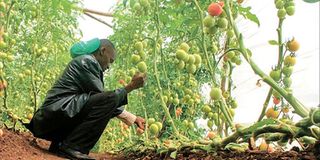Planting the seeds of subsidies in Kenyan farms

African farmers can out-compete their western counterparts if given the right support and access to credit facilities. Photo / file
If you can’t beat them, join them. That seems to be the government’s newest mantra as it tries to tackle food insecurity in the country amidst runaway prices in the face of a dilapidating global food shortage.
Determined to improve the country’s food productivity, the government has began offering a form of subsidy to its farmers.
This is despite the controversy surrounding the subsidies at the seemingly never-ending World Trade Organisation negotiations.
Big differences have characterised the WTO talks over the subsidies as developed nations, which coincidentally heavily subsidise their farmers, try to stop their developing counterparts from implementing such schemes.
But under the National Accelerated Agricultural Inputs Programme, the government began rolling out a targeted or smart subsidy scheme dubbed Kilimo Plus last year.
“We are closely monitoring the programme’s implementation besides training the beneficiaries at no cost,” says Dr Romano Kiome, the Permanent Secretary in the Ministry of Agriculture.
The scheme, which is currently underway in 25 of the targeted initial 45 high potential districts in the country, allows beneficiaries to receive Sh7,000 in vouchers to buy farm inputs—seeds, fertilisers and chemicals—from selected dealers. The government redeems the vouchers using commercial banks.
Planned to spread to 70 districts, the project targets the poor and vulnerable groups such as Kenyans with less than an acre of land and those who rely on relief foods.
Transform farming
The government expects to get $10 million (about Sh80 million) from the European Union soon to boost the implementation of the scheme in which it has earmarked Sh200 million annually.
“We want to remove the concept of subsistence farming from our books and minds. If such farming is not practised in Europe, why should we have it?” Dr Kiome says of the ambitious five-year strategy.
Once complete, it seeks to transform farming in the country into a commercial enterprise replacing the current subsistence or small-scale farming.
The WTO controversy notwithstanding, the government is buoyed in its resolve to implement the scheme by the huge support it is getting from different quarters.
Among its key supporters include the Alliance for a Green Revolution in Africa (AGRA), chaired by former United Nations secretary-general Kofi Atta Annan, and the World Bank.
“The programme is a bold effort to reach poor farmers with farm inputs and it sends a powerful signal that it (government) cares for poor farmers,” Dr. Akin Adesina, the AGRA vice president, told Smart Company in an interview last week.
According to statistics available, OECD (Organisation for Economic Co-operation and Development) countries especially Japan, US, Australia, Canada and the EU are notorious for providing subsidies to their farmers.
They spend over $280 billion (about Sh22.4 trillion) annually on subsidies. The EU and US spend over $127 billion and $30 billion respectively annually subsidising their farmers.
“African farmers, Kenyans included, can out-compete farmers in Europe or the US if they are given similar levels of support,” says the AGRA boss.
Even the World Bank supports the subsidy programme. In its World Development Report 2008: Agriculture for Development, released mid this year, the bank says “Market-smart” subsidies—delivered for example through targeted vouchers and matching grants—can be used to jump-start agricultural input markets.
Dr John Akoten, a research fellow in charge of agriculture and industry at the Institute of Policy Analysis and Research, says Africa should act fast.
“Given that agriculture is the main source of livelihood in developing countries, it makes sense for Africa, including Kenya, to subsidise agriculture,” says Dr Akoten who holds a PhD in International Development Studies from the National Graduate Institute for Policy Studies in Tokyo, Japan.
Besides South Africa and Kenya, other African governments are waking up to the programme. Among others, Malawi, Tanzania, Nigeria, Ghana, Mali, Mozambique, Rwanda, Burkina Faso and Senegal are now offering smart subsidies.
Malawi led the way. It started with $50 million in support for farmers— subsidised seeds and fertilisers—in 2005/07 and followed it up with $60 million in 2006/07.
The Southern Africa country moved from being a poor hungry country to a food surplus country in just two seasons. It produced over 1.3 million tonnes of maize above its food needs, enabling it to export $160 million worth of maize to Zimbabwe and donate 10,000 tonnes of maize to Lesotho and Botswana.
“That is a green revolution on its way,” says Dr Adesina.
The World Bank report warns that input promotion schemes, like any subsidies, they must be used with caution because they have high opportunity costs for productive public goods and social expenditures. They are also at risk of political misuse and, once implemented, may be impossible to reverse.
Dr Akoten concurs and calls for mechanisms to gradually wean off farmers from the subsidies and make them more competitive.
“We are aware of that and have put in place mechanisms to ensure that the programmes we have meet their intended objectives,” says Dr Kiome.
The PS says the idea is for the farmers under the subsidy scheme to be able to produce enough crops in two seasons so that they can graduate into another scheme, a cheap credit programme dubbed Kilimo Biashara.
Under this programme, farmers, agro-dealers, agro-processors and others linked to agriculture can access cheap credit from a $50 million fund, which was launched early this year by the government in partnership with AGRA, Equity Bank and the International Fund for Agricultural Development (IFAD).
Hailed as the first of its kind in Africa to work for smallholder farmers at such a scale, the programme’s goal is to reach 2.5 million farmers.
“The key is to enable as many farmers as possible to access cheap finance in order to transform their farming into a well-paying and commercially viable venture,” says Dr James Mwangi, the Equity Bank chief executive.




